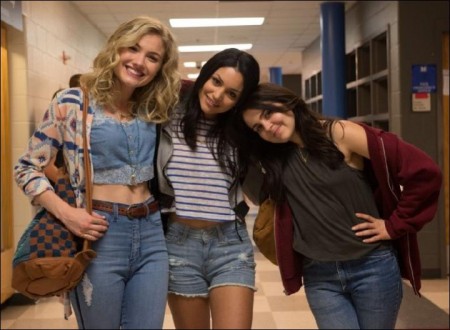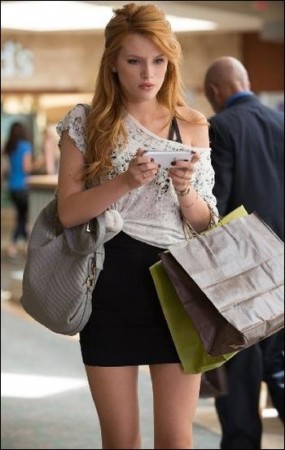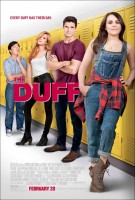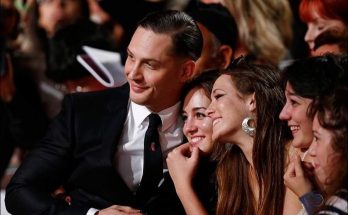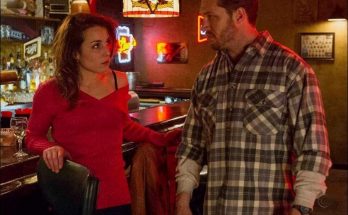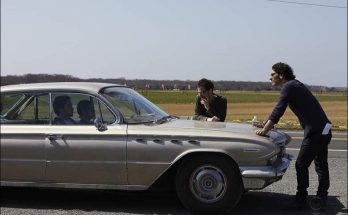Tagline: You either know one, you have one, or you are one.
The DUFF Movie Storyline. Bianca is a content high school senior whose world is shattered when she learns the student body knows her as ‘The DUFF’ (Designated Ugly Fat Friend) to her prettier, more popular friends. Now, despite the words of caution from her favorite teacher, she puts aside the potential distraction of her crush, Toby, and enlists Wesley, a slick but charming jock, to help reinvent herself. To save her senior year from turning into a total disaster, Bianca must find the confidence to overthrow the school’s ruthless label maker Madison and remind everyone that no matter what people look or act like, we are all someone’s DUFF.
The Duff (stylized as THE DUFF) is an American teen comedy film directed by Ari Sandel and written by Josh A. Cagan, based on the novel of the same name by Kody Keplinger. The film stars Mae Whitman, Robbie Amell, Bella Thorne, Bianca A. Santos, Skyler Samuels, Allison Janney, and Ken Jeong. The film was released on February 20, 2015, by Lionsgate and CBS Films. It is the first film for which Lionsgate took over CBS Films’ distribution functions.
The Book Comes to the Big Screen
Executive Producer Lane Shefter Bishop first learned of the novel THE DUFF when she saw the partially written book in the office of Joanna Stampfel-Volpe, a book agent in New York. Bishop instantly loved the title and the idea, and read the book that night. The next day, she called Stampfel-Volpe and asked for the chance to secure a movie deal. Bishop immediately sent the project to producers McG and Mary Viola of Wonderland Sound and Vision and said, “You have to read this now!”
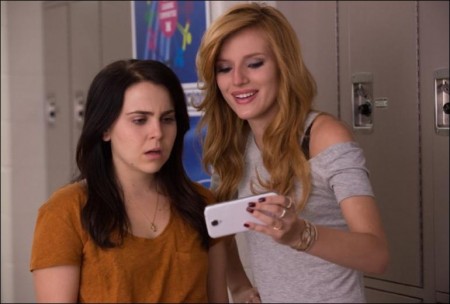
About the Production
McG and Viola had previously worked with the film’s director Ari Sandel, the Academy Award winning director, producer and writer of the comedic short film West Bank Story, on the action webisode series, Aim High, about a 16-year old high school student who lives a double life as a teen spy.
“Ari directed the second season of Aim High for us. We said if we ever get the chance to make a movie with this guy, we are going to do it,” says McG. “He is terribly intelligent, a monster talent and we share the same aesthetic. I am so happy to see him thrive in this environment. He has command over the set. He’s got the respect of the actors. He is directing while managing the difficulties of the budget, working with the studio, and you know, putting up with my loud voice. And he is doing it without any hiccups.”
“He has a natural sense of comedy both intuitive and based on experience. He is also very encouraging of the actors to improvise,” explains Producer Susan Cartsonis of Sandel. “It is a delight to watch him work and a lot of fun to work with him. He is very much a guy’s guy but he has three younger sisters and somewhere inside of him he has the soul of a teenage girl. He was so collaborative and worked closely with Mary and myself, along with all the girls in our cast. I think it shows in how well he captured the experience of being a teenage girl.”
For Sandel, the opportunity to make a teen comedy (a genre that he has long admired) was one he couldn’t pass up. “I think any comedy director is excited at the opportunity of doing a high school film because we all grew up with iconic high school films, whether it’s John Hughes’ films or Mean Girls or Superbad. Those movies really stick with you through your teenage years.”
“Ari definitely understands what it is to be a cool kid, but he has that nerd center which really helps him relate to both sides,” says Cagan.
McG believes that one of the keys to making a really funny comedy is getting the actors to feel comfortable on set and keeping an environment where the actors are allowed to play. Sandel did just that. He encouraged the cast to bring their own real life high school perspectives and experiences to the film. Mae Whitman credits Sandel for keeping the delicate tone of being funny while still having heart and depth. She felt very in tune and collaborative with her director. “We played a lot and we tried a million different things on set,” she says.
Actor/comedian Ken Jeong agrees. “Ari is amazing because everything he does is organic and that’s the best way to describe his process. His style is so relaxing for actors, ‘If it feels funny, do it’.”
“I was surprised by the complete comfort of the actors,” McG says. “Everybody was free and they wanted to be there and couldn’t wait for their turn to be in front of the camera. There was this fearlessness that really showed up and made for some great performances.”
“(Ari) is also just filled with boundless energy,” says Cagan. “The way he talks and the way he acts is the way he shoots…it’s all one.”
“Ari’s awesome,” agrees actor Robbie Amell. “He’s very young and hip and cool and he knows when something doesn’t work.
“We got about 100 pages of the book in manuscript form” says Viola. “Lane emphasized that the book was very special.” Like Bishop, Viola read the pages overnight.
“I called Lane the next day and said ‘This is amazing. The voice is so original. We have to get this book,'” she says. McG agreed. “I just thought it was something that was ‘zeitgeisty’, of-the-moment – so relatable and just true to life,” he says.
The producers were soon surprised to find that the original voice belonged to author Kody Keplinger, who wrote the book titled THE DUFF when she was just 17 years-old.
“We had no idea she was a teenager until Lane was working out the details of the deal and Kody said she would need to discuss it with her mother, “says Viola.
Bishop says, “I thought, ‘This cannot be a 17-year-old. She has the high school voices down, but this is someone who knows how to write because the emotion woven throughout is dead on.’ There’s a lot going on (in the book) and a lot of complexity underneath it all.”
As much as the producers loved the book and the characters at the heart of the story, they needed to put it in a film structure and adjust certain aspects to make it work visually for an audience. They enlisted screenwriter Josh A. Cagan (Bandslam).
“Sometimes while condensing a book, you have to lose certain things and change others but we stuck with the elements that were the most important and integral to telling the story,” says Viola.
“The changes were a challenge,” Cagan says. “I needed to come up with a device that would drive the narrative as we took the story from book to screen. I was struck by the idea of the Kubler-Ross model of the five stages of death – denial, anger, bargaining, depression and acceptance – albeit a seemingly odd device for a comedy.”
Cagan took that model and applied it to the five emotional stages main character Bianca (played by Mae Whitman) works through in terms of being the DUFF. “All writers are looking for a beginning, middle and end,” Cagan says. “The nice thing about the Kubler-Ross model is that it has all those things. It gave the story this structure; I just began following this path that led me through the script.”
CBS Films received a first draft of the script on spec. They called the next day to tell the producers they wanted to make the movie. As the studio developed the script with the producers and Cagan, everyone wanted to make sure that Keplinger and her legion of fans were happy with the direction the film was taking. They sent Keplinger the script.
“We were ecstatic to find out that Kody was delighted with the story and that she understood we had to change around some things,” says Viola. “She completely got it.”
“Any time you are adapting a book into a film, things are going to change. If you adapt a book as it is onto the screen, it is probably going to be a pretty long and boring movie,” explains Keplinger. “What has always mattered to me is the message of the book – the theme that at some point in life, everyone feels like the DUFF. As things proceeded and as I watched the casting, I could see how passionate everyone involved was about the project. I knew they cared as much about the spirit of the story as I did. I’m just so excited to see the movie and message come to life.”
Being The Duff
Even before the term DUFF (Designated Ugly Fat Friend) entered the high school vernacular, there have always been unspoken differences in social circles. It seems that everyone has friends who are more attractive, smarter, or more talented at some point in their lives, as well as friends who are not as attractive, smart or talented. The reality is that everyone is a DUFF and everyone has a DUFF, and nowhere is that more pronounced than in high school.
“I clearly remember my senior year of high school when I walked into the cafeteria one morning and a girl at my table was talking about how she hated when guys referred to her friend as the DUFF,” says Keplinger. “I didn’t know what it meant so I had to ask and she told me that it meant the designated ugly fat friend. I had three reactions. I first thought, ‘That’s hilarious,’ and then I thought ‘Oh no wait, that’s actually really mean,’ and then I thought ‘That’s me.'”
“Later I was telling my friends this and I realized that they all thought they were the DUFF. And so I started saying that I would, as a joke, write this book called The DUFF but instead of the girl taking her ponytail out and her glasses off and becoming a supermodel, she would stay the DUFF throughout.”
“The most common thing I’ve gotten is people who read THE DUFF and email me and say ‘I’m the DUFF of my group of friends and this book really meant something to me,'” says Keplinger. “It doesn’t matter what you look like. It’s not about being fat or thin, or short or tall. It could be that you don’t feel like you’re the smartest in the group or the most talented in the group. It’s about feeling insecure and inadequate, and everyone has been there.”
McG can relate, as he knows he was the Duff. “When I was growing up, my best friend was spectacularly good looking and I wasn’t really aware that I was the proxy entry into connecting with him but it became clear through the years of high school. I think you can be anyone’s DUFF. It doesn’t really have anything to do with what you actually look like. It has to do with the role you play.”
Although the cast and filmmakers all feel strongly about the message of the film, everyone agrees that the movie is first and foremost a very funny comedy.
“One of the things about comedy is it lets you touch on very important or controversial subjects in a way that you wouldn’t be able to in other aspects because you’re not trying to be super dramatic which is going to feel heavy-handed and boring,” says Sandel. “If you can make jokes about the subject, it actually makes it lighter.”
High School in the Age of Social Media
The DUFF explores the perils of the high school landscape in a world where social media is an unavoidable part of daily life. Bianca must navigate the pain of being categorized, not just in private, but also in public. The cast was keenly aware of the importance of shining a light on this current issue in a humorous package.
“The idea of doing a coming of age film that also deals with bullying, which is really in the zeitgeist right now with everything happening on the internet, and how pervasive social media is in high school life, really intrigued me actually,” says Sandel.
“Texting and all this stuff, it’s a whole new ballgame as far as bullying, and it’s rampant,” says Whitman. “It’s rampant everywhere in America right now. There’s this whole mentality of ripping other people down. And it sort of is perpetuated on the internet so I think it’s a cool new twist to be illuminating how horrible that stuff is, because it’s really bad.”
“The added thing of course is the fact that kids are now texting,” says Janney. “And there’s Twitter and putting things up on YouTube. I can imagine the possibility for public humiliation is just enormous.”
In the film, a personal moment of Bianca’s gets recorded and is quickly disseminated through social media, exposing something that should have gone unobserved to the entire school.
“Being bullied and being called names and all that stuff is a very serious thing,” says Eversman. “She (Bianca) had this horrible video made about her and it spreads like wildfire but she takes it in stride. It’s hurtful for a minute, but then she’s able to pick herself up.”
Madison’s relationship with social media is different than Bianca’s. She is particularly obsessed with social media and this affects her whole being. Social media is her stage. “When she’s putting down characters in the film and (her sidekick) Caitlyn is taping her the whole time, Madison’s really just doing it to get a laugh. She thinks when people watch her, they’re gonna be like, ‘Oh, look how funny she is, and cute,” says Thorne. “She’s always performing and that gets in the way, and if she didn’t have that, I don’t think she would be the way she is at all.”
“High school is just a rich, rich place,” says McG. “You discover a lot of emotion. You become sexually aware. You also start to quietly ask yourself, ‘Hey, am I less smart or smarter than my friends?’ or ‘Am I good at sports or are others more athletic?’ or ‘Am I funny? Funnier than my friends?’ And all these questions exist in an age of social media that’s more present than ever and moving at a much, much faster rate than ever before. And who you are becomes extrapolated as a function of it hits the digital airwaves immediately.”
The DUFF (2015)
Directed by: Ari Sandel
Starring: Mae Whitman, Bella Thorne, Robbie Amell, Bianca A. Santos, Skyler Samuels, Romany Malco, Nick Eversman, Allison Janney
Screenplay by: Josh A. Cagan
Production Design by: Aaron Osborne
Cinematography by: David Hennings
Film Editing by: Wendy Greene Bricmont
Costume Design by: Eric Daman
Set Decoration by: Nicole LeBlanc
Music by: Dominic Lewis
MPAA Rating: PG-13 for crude and sexual material throughout, some language and teen partying.
Studio: CBS Films
Release date: February 20, 2015
Visits: 539
